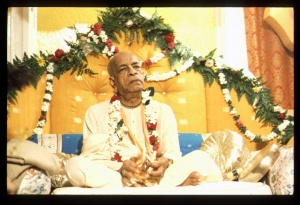SB 4.25.14: Difference between revisions
m (1 revision(s)) |
No edit summary |
||
| Line 1: | Line 1: | ||
{{info | {{info | ||
|speaker= | |speaker=Nārada Muni | ||
|listener=King | |listener=King Prācīnabarhiṣat | ||
}} | }} | ||
[[Category:Srimad-Bhagavatam - Canto 04 Chapter 25]] | |||
[[Category:Bhagavatam Verses Spoken by Narada Muni - Vanisource|042514]] | |||
<div style="float:left">'''[[Srimad-Bhagavatam]] - [[SB 4|Fourth Canto]] - [[SB 4.25: The Descriptions of the Characteristics of King Puranjana|Chapter 25: The Descriptions of the Characteristics of King Purañjana]]'''</div> | |||
<div style="float:right">[[File:Go-previous.png|link=SB 4.25.13]] '''[[SB 4.25.13]] - [[SB 4.25.15]]''' [[File:Go-next.png|link=SB 4.25.15]]</div> | |||
{{RandomImage}} | |||
==== TEXT 14 ==== | ==== TEXT 14 ==== | ||
<div | <div class="verse"> | ||
prākāropavanāṭṭāla- | :prākāropavanāṭṭāla- | ||
parikhair akṣa-toraṇaiḥ | :parikhair akṣa-toraṇaiḥ | ||
svarṇa-raupyāyasaiḥ śṛṅgaiḥ | :svarṇa-raupyāyasaiḥ śṛṅgaiḥ | ||
saṅkulāṁ sarvato gṛhaiḥ | :saṅkulāṁ sarvato gṛhaiḥ | ||
</div> | </div> | ||
| Line 16: | Line 22: | ||
==== SYNONYMS ==== | ==== SYNONYMS ==== | ||
<div | <div class="synonyms"> | ||
''prākāra''—walls; ''upavana''—parks; ''aṭṭāla''—towers; ''parikhaiḥ''—with trenches; ''akṣa''—windows; ''toraṇaiḥ''—with gates; ''svarṇa''—gold; ''raupya''—silver; ''ayasaiḥ''—made of iron; ''śṛṅgaiḥ''—with domes; ''saṅkulām''—congested; ''sarvataḥ''—everywhere; ''gṛhaiḥ''—with houses. | |||
</div> | </div> | ||
| Line 23: | Line 29: | ||
==== TRANSLATION ==== | ==== TRANSLATION ==== | ||
<div | <div class="translation"> | ||
That city was surrounded by walls and parks, and within it were towers, canals, windows and outlets. The houses there were decorated with domes made of gold, silver and iron. | That city was surrounded by walls and parks, and within it were towers, canals, windows and outlets. The houses there were decorated with domes made of gold, silver and iron. | ||
</div> | </div> | ||
| Line 30: | Line 36: | ||
==== PURPORT ==== | ==== PURPORT ==== | ||
<div | <div class="purport"> | ||
The body is protected by walls of skin. The hairs on the body are compared to parks, and the highest parts of the body, like the nose and head, are compared to towers. The wrinkles and depressions on different parts of the body are compared to trenches or canals, the eyes are compared to windows, and the eyelids are compared to protective gates. The three types of metal—gold, silver and iron—represent the three modes of material nature. Gold represents goodness; silver, passion; and iron, ignorance. The body is also sometimes considered to be a bag containing three elements (tri-dhātu): mucus, bile and air (kapha, pitta and vāyu). Yasyātma-buddhiḥ kuṇape tri-dhātuke. According to Bhāgavatam (10.84.13), one who considers this bag of mucus, bile and air to be the self is considered no better than a cow or an ass. | The body is protected by walls of skin. The hairs on the body are compared to parks, and the highest parts of the body, like the nose and head, are compared to towers. The wrinkles and depressions on different parts of the body are compared to trenches or canals, the eyes are compared to windows, and the eyelids are compared to protective gates. The three types of metal—gold, silver and iron—represent the three modes of material nature. Gold represents goodness; silver, passion; and iron, ignorance. The body is also sometimes considered to be a bag containing three elements (''tri-dhātu''): mucus, bile and air (''kapha, pitta and vāyu''). ''Yasyātma-buddhiḥ kuṇape tri-dhātuke''. According to [[Srimad-Bhagavatam|''Śrīmad-Bhāgavatam'']] ([[SB 10.84.13|10.84.13]]), one who considers this bag of mucus, bile and air to be the self is considered no better than a cow or an ass. | ||
</div> | </div> | ||
__NOTOC__ | |||
<div style="float:right; clear:both;">[[File:Go-previous.png|link=SB 4.25.13]] '''[[SB 4.25.13]] - [[SB 4.25.15]]''' [[File:Go-next.png|link=SB 4.25.15]]</div> | |||
__NOTOC__ | |||
__NOEDITSECTION__ | |||
Revision as of 12:22, 28 May 2021

A.C. Bhaktivedanta Swami Prabhupada
TEXT 14
- prākāropavanāṭṭāla-
- parikhair akṣa-toraṇaiḥ
- svarṇa-raupyāyasaiḥ śṛṅgaiḥ
- saṅkulāṁ sarvato gṛhaiḥ
SYNONYMS
prākāra—walls; upavana—parks; aṭṭāla—towers; parikhaiḥ—with trenches; akṣa—windows; toraṇaiḥ—with gates; svarṇa—gold; raupya—silver; ayasaiḥ—made of iron; śṛṅgaiḥ—with domes; saṅkulām—congested; sarvataḥ—everywhere; gṛhaiḥ—with houses.
TRANSLATION
That city was surrounded by walls and parks, and within it were towers, canals, windows and outlets. The houses there were decorated with domes made of gold, silver and iron.
PURPORT
The body is protected by walls of skin. The hairs on the body are compared to parks, and the highest parts of the body, like the nose and head, are compared to towers. The wrinkles and depressions on different parts of the body are compared to trenches or canals, the eyes are compared to windows, and the eyelids are compared to protective gates. The three types of metal—gold, silver and iron—represent the three modes of material nature. Gold represents goodness; silver, passion; and iron, ignorance. The body is also sometimes considered to be a bag containing three elements (tri-dhātu): mucus, bile and air (kapha, pitta and vāyu). Yasyātma-buddhiḥ kuṇape tri-dhātuke. According to Śrīmad-Bhāgavatam (10.84.13), one who considers this bag of mucus, bile and air to be the self is considered no better than a cow or an ass.